The Alberta Family Wellness Initiative
The Palix Foundation is a private philanthropic organization dedicated to improving the health and well-being of individuals, families, and communities across Alberta and beyond. The Foundation's flagship initiative, the Alberta Family Wellness Initiative (AFWI) aligns science, policy, and practice in the area of brain development to support the foundations of all health. The AFWI partnered with the National Scientific Council on the Developing Child at Harvard University and the FrameWorks Institute to develop the Brain Story and Resilience Scale, which translates this complex science into an accessible, engaging story-form. The AFWI has mobilized transformative system shifts driven by the application of science at the individual, organization, and community levels across the health, education, child services, and justice sectors.
Brain Story Certification Course
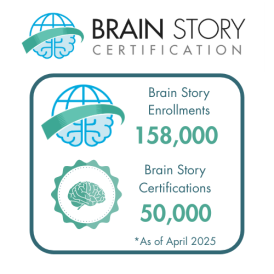 The Brain Story Certification Course shares scientific learnings from leading experts on brain development, genetics, epigenetics, mental health, addiction, and resilience to a wide audience, including (but not limited to) policymakers, healthcare practitioners, educators, and child services providers. The course helps audiences understand brain development and its implications for child development, mental health, addiction, and other diseases and disorders experienced throughout the lifespan and aging.
The Brain Story Certification Course shares scientific learnings from leading experts on brain development, genetics, epigenetics, mental health, addiction, and resilience to a wide audience, including (but not limited to) policymakers, healthcare practitioners, educators, and child services providers. The course helps audiences understand brain development and its implications for child development, mental health, addiction, and other diseases and disorders experienced throughout the lifespan and aging.
The online course presents the Brain Story, a collection of six metaphors
that convey key aspects of brain development and lifelong development in
understandable language. The AFWI Developmental Evaluation identified
that the primary benefits conferred by taking the course include increased
empathy towards others and oneself, as well as a common language about
brain science that facilitates communication and collaboration[1]
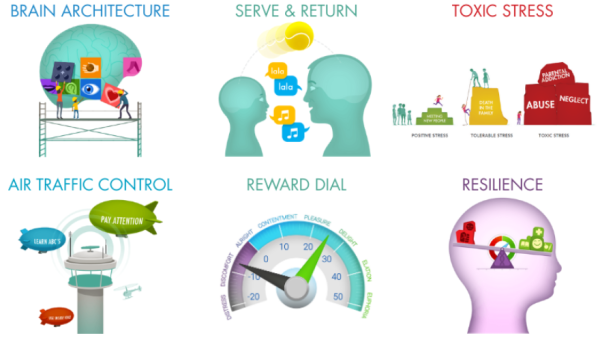
The Resilience Scale
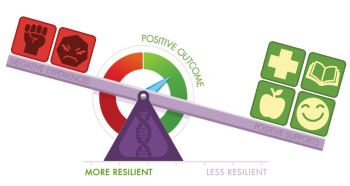 Resilience can be defined as the ability to respond positively in the face of adversity[2]. The Resilience Scale Metaphor depicts how positive and negative experiences interact to influence developmental and mental health outcomes, as well as the impact of core life skills on resilience[3]. The Resilience Scale explains why individual differences exist in our responses to adversity and how our resilience may change over time.
Resilience can be defined as the ability to respond positively in the face of adversity[2]. The Resilience Scale Metaphor depicts how positive and negative experiences interact to influence developmental and mental health outcomes, as well as the impact of core life skills on resilience[3]. The Resilience Scale explains why individual differences exist in our responses to adversity and how our resilience may change over time.
Early learnings from the Resilience Scale indicate that it is an effective visual tool to facilitate communication between practitioners and their clients or patients and a means of measuring change in resilience over time.[3]
The Brain Story and Resilience Scale Framework
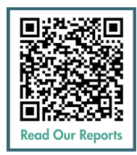 The AFWI has made significant advances towards our goal of embedding the Brain Story across systems to produce concrete changes in policy and practice. Using the Resilience Scale as a framework, we have established a tri-fold strategy that evaluates the needs of individuals, clarifies the role of organizations and service providers, and works towards systems integration. Three AFWI reports are available that expand on each level of the strategy.
The AFWI has made significant advances towards our goal of embedding the Brain Story across systems to produce concrete changes in policy and practice. Using the Resilience Scale as a framework, we have established a tri-fold strategy that evaluates the needs of individuals, clarifies the role of organizations and service providers, and works towards systems integration. Three AFWI reports are available that expand on each level of the strategy.
This strategy is introduced in the 3-hour Resilience Scale Masterclass which educates policy makers, practitioners, and the public about brain development and its impact on health, mental health, and overall well-being throughout the lifespan. Delivered in three parts, its purpose is to provide foundational knowledge and a common language accessible across disciplines.
-
Part 1 reviews the metaphors of the Brain Story with a focus on how the Resilience Scale can be used as a practical tool to assess and monitor resilience in individuals.
-
Part 2 uses the Harvard Center on the Developing Child’s Frontiers of Innovation (FOI) platform to clarify the roles of organizations in contributing to resilience.
-
Part 3 explores resilience at a system level by mapping regional services according to how they align with the Resilience Scale.

Report 1: Using the Resilience Scale as a Tool for Individuals
The Resilience Scale Toolkit
Part 1 of the Resilience Scale Masterclass discusses how to use the Resilience Scale as a practical tool. To practice the use of the Resilience Scale as a tool, participants complete a training exercise called the Resilience Scale Toolkit. In this exercise, participants are asked to read one of three unique scenarios that describes the life of a hypothetical individual, use details from the scenario to construct that person’s Resilience Scale, and explain how each element they identified contributes to overall resilience.
In partnership with the University of Oxford, the AFWI has analyzed the responses of 308 participants from nine Masterclasses and found that the Toolkit is effective at encouraging participants to apply the science of the Resilience Scale and is viewed by service providers as clear, useful, and applicable to their work.
report 2: Organizational Change Management Using the Resilience Scale
Quality Improvement Proof of Concept
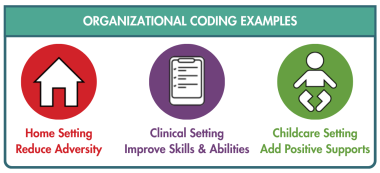 The FOI, the research and development platform of the Harvard Center on the Developing Child, devised a coding template to catalog its portfolio of projects based on their context (i.e., where the project takes place) and primary design (i.e., whether the project aims to reduce sources of adversity, strengthen core life skills, or support responsive relationships). This template maps onto the Resilience Scale by coding projects according to the component of the Scale they target.
The FOI, the research and development platform of the Harvard Center on the Developing Child, devised a coding template to catalog its portfolio of projects based on their context (i.e., where the project takes place) and primary design (i.e., whether the project aims to reduce sources of adversity, strengthen core life skills, or support responsive relationships). This template maps onto the Resilience Scale by coding projects according to the component of the Scale they target.
The AFWI adapted the FOI template to code programs and services from across sectors to help service providers gain a clearer understanding of the work they are doing with the populations they serve. Our team visited 11 organizations in Alberta to learn about the programs and services they offer and apply the coding to each distinct offering. Feedback from the participating organizations indicated that this coding exercise:
-
Helped match clients with appropriate services,
-
Improved communication between service providers, and
-
Can be used to foster systems alignment.
report 3: Creating Systems Integration with the Resilience scale
Strategy for Systems Integration
Embedding the Brain Story and Resilience Scale at the system level requires a shared competency and active engagement from community leaders. Therefore, we have standardized a strategy that consists of the following two components to help facilitate systems-level integration for any community or region interested in making a shift towards policies and practices that are based in Brain Story science.

The goal of the CoPs will be to improve service provision and outcomes for individuals, families, and the community. Each CoP will define their own specific goals, action items, and timelines. The AFW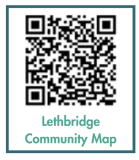 I will facilitate initial connections and meetings to set in motion what is intended to be a community-driven initiative.
I will facilitate initial connections and meetings to set in motion what is intended to be a community-driven initiative.
Next Steps
The AFWI is working towards the development of easily accessible platforms to help organizations and systems implement the Brain Story and Resilience Scale Framework.
For Individuals – create a protocol for implementing the Resilience Scale in clinical practice in acute, primary and community care settings and integrate the Resilience Scale into current health systems platforms. These steps will enable service providers to work with clients in creating their own Resilience Scale, which can be (1) updated over time as services are accessed and (2) easily shared across providers.
For Organizations – collaborate with organizations to embed the Resilience Scale coding template into existing service directories to support service providers in making referrals according to the area of a client’s Resilience Scale they wish to address.
For Systems – generate community maps that depict systems as a network of interconnected entities and develop a community-wide evaluation framework to measure implementation of the Brain Story and Resilience Scale Framework.
For more information and guidelines on how to start implementing this strategy,
reach us at contact@palixfoundation.org.
Video Resources
You are welcome to use these videos with your staff, clients/patients, and wider community as desired.
 A Real-Life Application of the Resilience Scale with RCMP Superintendent Mike McCauley
A Real-Life Application of the Resilience Scale with RCMP Superintendent Mike McCauley
In this video, Superintendent Mike McCauley of the Alberta Royal Canadian Mounted Police shares his personal story through the lens of the Resilience Scale, a core concept of the Brain Story by the Alberta Family Wellness Initiative. He illustrates how positive supports in his life helped buffer the adversities he faced, strengthening his capacity for resilience throughout his life. Mike's story depicts how potential sources of toxic stress can be buffered to tolerable stress.
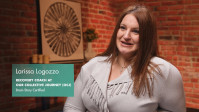 Building Resilience - Brain Story Certification Graduate: Larissa Logozzo
Building Resilience - Brain Story Certification Graduate: Larissa Logozzo
Larissa Logozzo, Recovery Coach at Our Collective Journey, shares how the Brain Story and Resilience Scale gave her an understanding and hope about the resources she needed to tip her scale into a positive outcome for life.
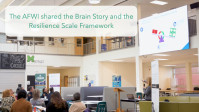 Medicine Hat: Building Resilience for Individuals, Families, and Community
Medicine Hat: Building Resilience for Individuals, Families, and Community
Medicine Hat community members share the importance of using the Brain Story and the Resilience Scale as a common knowledge base and a common language to better apply resources and practices that will improve outcomes for individuals, families and their community.
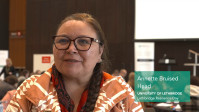 The Resilience Scale: Amplifying Indigenous Perspectives
The Resilience Scale: Amplifying Indigenous Perspectives
Indigenous community members from around Alberta share how the Brain Story and Resilience Scale Framework has impacted their work and informed their practice, in both personal and professional ways.
new training video
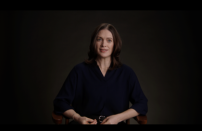 The Resilience Scale: A Tool for Change
The Resilience Scale: A Tool for Change
Presented by Teresa Killam, MEd MD CCFP FCFP, this 90-min training video reviews the key metaphors of the Brain Story with a focus on how the Resilience Scale metaphor can be used as a practical tool to assess and monitor resilience in individuals. The training is available as three different applications:
- Online training for physicians, approved for Continuing Medical Education (CME) credit by the Royal College of Physicians and Surgeons of Canada
- New module appended to the Brain Story Certification Course
- Stand-alone training for all interested individuals - access it through the course catalog of the Brain Story learning platform
[1] https://www.albertafamilywellness.org/who-we-are/theory-of-philanthropy
[2] Alberta Family Wellness Initiative (2020). Commentary and AFWI Developmental Evaluation: Evaluation Report and Case Studies.
[3] Alberta Family Wellness Initiative (2021). Early Learnings About Uses for the Resilience Scale Metaphor in Practice.

